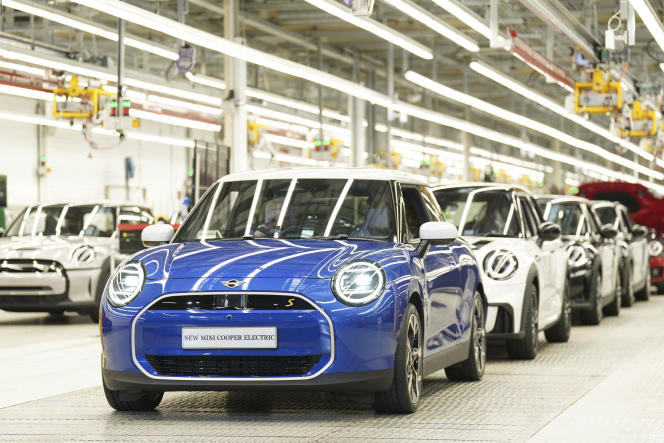A cloud of uncertainty seemed to weigh down the atmosphere at the major British automobile industry conference devoted to the electric transition, organized on Monday September 18 in London. Stuck between the United States and China, which subsidize massively, and the European Union (EU), which is preparing its response and considering imposing customs duties on Chinese imports, manufacturers established in the United Kingdom are facing to major difficulties.
“China has decided to be at the forefront of vehicle electrification, with a very active policy, the United States is following with the Inflation Reduction Act [qui subventionne les véhicules électriques]. Do we just want to follow? » worries James Widmer, director of Advanced Electric Machines, a manufacturer of electric motors.
Certainly, several investments in favor of the electric transition have been announced in 2023. BMW will inject 600 million pounds (696 million euros) to produce the electric Mini in Oxford, reversing its initial decision to build everything in China. Nissan is developing a gigafactory in Sunderland, in the north-east of England, with the Chinese company AESC.
Pressure
For its part, Tata is investing 4 billion pounds in another gigafactory. “ But it’s insufficient”warns Mike Hawes, director of the Society of Motors Manufacturers and Traders (SMMT), the body representing the sector. “We are waiting for an industrial strategy from the British government”, he declares. Especially since several serious problems require an urgent solution.
The first, immediate, is a direct result of Brexit. London and Brussels are currently negotiating new rules on battery trade. If they cannot agree, customs duties of 10% will be imposed on electric vehicles.
At the end of 2020, the Brexit agreement made it possible to exempt car sales between the EU and the United Kingdom from customs duties, but on the condition that at least 40% of spare parts are manufactured locally. From 2024, these rules will tighten, increasing to 45%, and especially 60% for batteries. However, the vast majority of manufacturers do not respect this level.
The automobile industry wants to be confident. In the absence of an agreement, customs duties would be imposed on cars manufactured in the United Kingdom and exported to the EU (750,000 vehicles in 2022), but also on those manufactured in the EU and imported into the United Kingdom (1, 3 million vehicles in 2022). European manufacturers are also pushing to find an agreement. “Anything that makes vehicles more expensive is a concern”underlines Alex Smith, the boss of Volkswagen in the United Kingdom, which has a 20% market share in this country.
You have 39.82% of this article left to read. The rest is reserved for subscribers.
